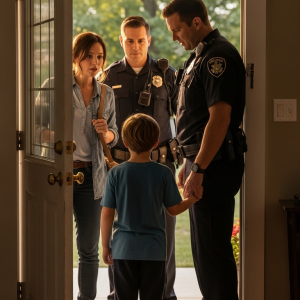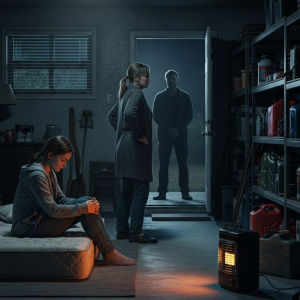My name is Jacob, and I’m 27 now. But for the first fourteen years of my life, I was the family’s spare part. My parents, immigrants who built a life in the US from nothing, were obsessed with a single, unyielding path to success: perfect grades. Anything less was a catastrophic failure, a personal insult to the sacrifices they had made.
To make matters worse, I had a benchmark I could never meet. My sister, a year older than me, was a classroom prodigy. She was the golden child, the academic star, and I was her shadow, constantly subjected to a brutal game of comparison at school and at home.
Through elementary school, things were manageable. I earned A’s in most subjects, which was acceptable. But when my sister graduated with a flawless A+ average and the title of class valedictorian, my simple A’s suddenly weren’t enough. I wasn’t in the top ten. That was the beginning of their disappointment.
In middle school, the ritual began. After every report card, my parents would sit me down at the kitchen table. On one side would be my grades; on the other, my sister’s from the previous year. A red pen would circle every instance where I fell short. “Why is this a B+ when your sister earned an A?” my father would demand. “Are you not trying? Are you lazy?”
As the pressure mounted, my grades began to slip. The more they pushed, the more I struggled to memorize the information my sister seemed to absorb so effortlessly. I was good with numbers and logic—things you couldn’t just learn by rote—but that didn’t matter. With every dip in my scores, from A’s to B’s and then to C’s, their rage escalated.
The punishments were cruel and methodical. They would make me kneel on the hardwood floor for hours, my stomach growling as the smell of dinner drifted from the kitchen. They would sometimes starve me the night before an exam, believing an empty stomach would force me to focus. For a month leading up to finals, my video games would be confiscated, I’d be caged at home, and all my favorite foods were forbidden.
“When can I have some ice cream?” I’d ask.
“Get good grades, then you can have ice cream,” was the constant, unvarying reply. Eventually, I just stopped asking.
My parents ran a small grocery store, a business they’d built through sheer grit and determination. They had come from families where poverty was a constant presence, and they believed, with an almost religious fervor, that academic perfection was the only escape. I appreciated their hard work, but their methods were suffocating. They weren’t just encouraging education; they were torturing a child in its name.
The more severe their punishments became, the more rebellious I grew. I started deliberately skipping classes, finding solace in the solitude of the playground. I would fill my exam papers with song lyrics and stupid jokes, small acts of defiance that sent them into a frenzy. They responded by locking me in the basement with my books, my only release being the completion of my lessons.
On weekends and during summer vacations, they began taking me to the grocery store with them. It was meant to be another punishment, a way to keep me from sneaking out to play. But something unexpected happened: I loved it. I enjoyed interacting with customers, helping them choose between brands, and managing the cash register. I had a natural talent for sales.
One evening, I casually mentioned that I wanted to be a salesman when I grew up. My parents were horrified. To them, sales was a job for the uneducated. With all the money they were spending on my education, I was to become a doctor or an engineer. Anything less was a disgrace.
All this simmering tension finally exploded during my freshman year of high school. I pushed all their buttons and brought home a report card with a glaring, undeniable F-grade. It meant I would have to repeat a year.
They completely lost their minds. The verbal abuse reached a crescendo. They screamed that I had brought shame upon the family, that they could no longer bear the embarrassment I had inflicted upon them. There were no more punishments left in their arsenal; they had used them all.
So, they used their final one. They threw me out of the house. “You’re on your own now,” my father said, his face a mask of cold fury. “Don’t ever come back. Not even if you’re starving.” I was fourteen years old, standing on the curb with nothing but the clothes on my back and a profound sense of shock. I had been a difficult child, but I never imagined they would actually do this.
After the initial wave of terror subsided, a strange sense of freedom washed over me. For the first time in my life, there was no one to scream at me, no one to compare me to, no one to tell me I wasn’t good enough. The first night, I slept on a park bench. The next day, I walked downtown and started searching for a job.
I went from store to store, asking for any vacancy. After a dozen rejections, I walked into a beauty store. The owner, seeing a desperate but determined kid, gave me a challenge: sell an expensive lipstick as an add-on to a customer who had only come in for night cream.
I don’t know how I did it, but I channeled every bit of experience I had from the grocery store. I talked to the woman, listened to what she liked, and somehow, I made the sale. The owner, impressed by my passion, hired me on the spot. The pay was low, but he gave me a small storeroom to sleep in. As my sales numbers grew, I negotiated a commission on every product I sold.
That was the beginning of my real education. The very thing my parents had used as a punishment—working in their store—had given me invaluable, real-life experience. I learned about people, about business, about persuasion. I hopped jobs over the next few years, always seeking better pay and more opportunities.
At 21, I started my own company. We provide outsourced sales support to other small businesses. We close deals for them, from credit cards and insurance to cosmetics and books, and they pay us a hefty commission. It took five grueling years to become stable, but we made it. I started with a team of five, and now we are a company of 200 sales agents, generating millions in revenue for over 50 different clients.
For years, I had no contact with my family. Then, a few weeks ago, my mother started stalking my social media profiles. She liked old pictures, followed my accounts, and made her presence known. It was clear they were mesmerized by the lifestyle I now lived—the success they never believed I was capable of.
A week ago, she sent a text. “I miss you. Please come home.” I saw the message and left her on read. But the texts continued, filled with praise about how proud they were. My girlfriend warned me to stay away, convinced they would eventually try to extort money from me. But a part of me, the part that still carried the scars of my childhood, wanted to go back and show them exactly what the “loser” had become.
I showed up at their door. My father, who still believed I was some kind of con artist, wasn’t there. But my mother and sister were. My mom immediately launched into an apology, blaming my father’s old-fashioned beliefs for everything I had endured.
“It was Dad’s idea to be so strict,” she said, trying to rewrite history. “I was just following his instructions, as a good wife should.”
I pointed out that she was often the stricter of the two. She just laughed it off. “Oh, that was a century ago! Let’s move on and be a happy family!”
I asked my sister about her life. She had completed a master’s degree in literature but was struggling to find a teaching job. Despite her perfect grades, her poor communication and social skills, born from a lifetime of being isolated and forced to study, were holding her back. She, too, blamed our parents. I felt a pang of pity for her. In a way, she was a victim of their system just as much as I was.
Then my mom, after flattering me endlessly, invited me to a special dinner that weekend. I knew it was a setup, but I couldn’t resist. This was my chance.
My mom insisted that my father was organizing the dinner as a public apology. She said they were inviting all our close friends and relatives to celebrate my success. She told me to wear my best clothes and to be on time.
The rebellious kid in me couldn’t resist. I wore a gym sweatshirt, trekking shorts, and a baseball cap. And I showed up two hours late.
The rooftop section of the restaurant was filled with people. My parents were furious, but they masked it with tight, fake smiles. They hugged me and raised a toast, singing my praises. It was the first time my father had ever hugged me. It felt cold and hollow.
They bragged about my success, my possessions, and my lifestyle as if they were their own achievements. They were taking all the credit for shaping me into the man I had become, conveniently omitting the part where they had kicked that man out onto the street.
My outspoken aunt finally broke the spell. “Didn’t you guys throw him out of the house when he was a kid?” she asked loudly.
I burst out laughing, clapping at her courage. My parents’ faces flushed with embarrassment, but they quickly tried to recover. “That was a means to bring him onto the right track,” my father declared. “It was because of our tough love that he was able to do so well in life!”
That’s when I lost it.
I stood up, my voice cutting through the quiet chatter of the room. “That’s right, everyone! I owe all my success to my toxic parents. And you know what the best decision they ever made for me was? Kicking me out of the house to live on the streets!”
A shocked silence fell over the room. I looked directly at my parents. “You’re so confidently claiming you always knew I’d make it big. That’s funny, because I remember a different version. Didn’t you used to tell me I’d end up a loser? Homeless? A criminal?”
My voice grew stronger, fueled by years of repressed anger. “Remember how you deprived me of family vacations as punishment? How you used to lock me in the basement for hours without proper ventilation? You’re right. All of that was absolutely necessary to make me a better person.”
I turned to the assembled guests. “Maybe everyone in this room should do the same to their child! It’s the secret sauce of success, you know!”
My mother tried to intervene, but I shrugged her off. My sister tried to calm me, but I was beyond anyone’s control. My parents were in tears, but not of remorse—of pure, unadulterated humiliation. Death would have been preferable to this public shaming.
I don’t blame my sister for her silence growing up. She was a kid, just like me, trapped in the same toxic system. My parents did more harm to her than they ever did to me. At least I was able to rebel. She lost her spine by obeying them, and she’s still paying the price.
After my speech, I walked over to my parents. I told my mother not to contact me ever again. I told them that I had only come tonight to get my revenge. Then, I blocked her number.
Some of our relatives reached out afterward, expressing their sorrow for what I’d gone through. I told them I didn’t want sympathy. I just wanted everyone to know that cornering your child over grades will do them more harm than good. Our family is living proof of bad parenting. I plan to stay in touch with my sister and help her find her own path, on her own terms. But as for my parents, our relationship is, and will forever be, over.




